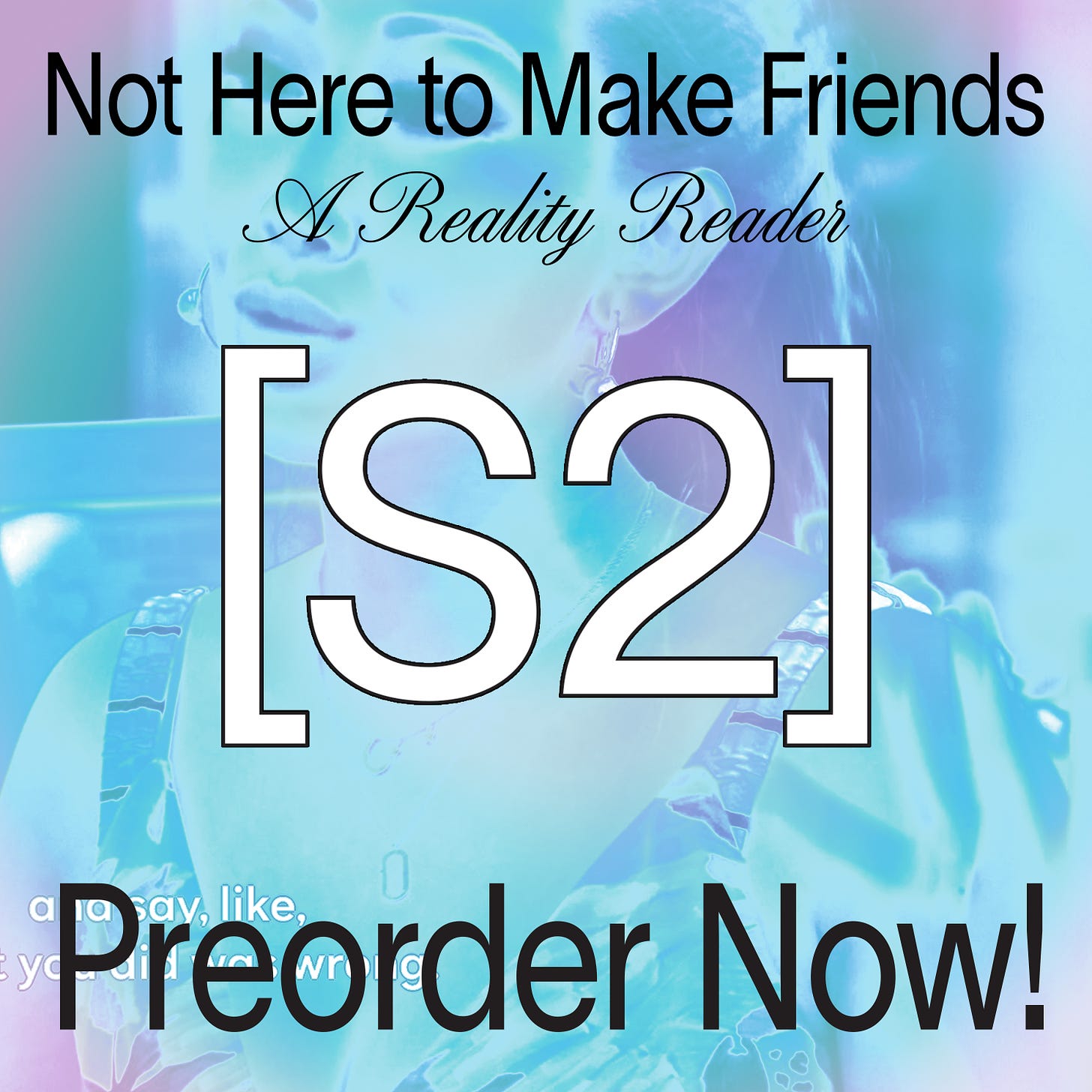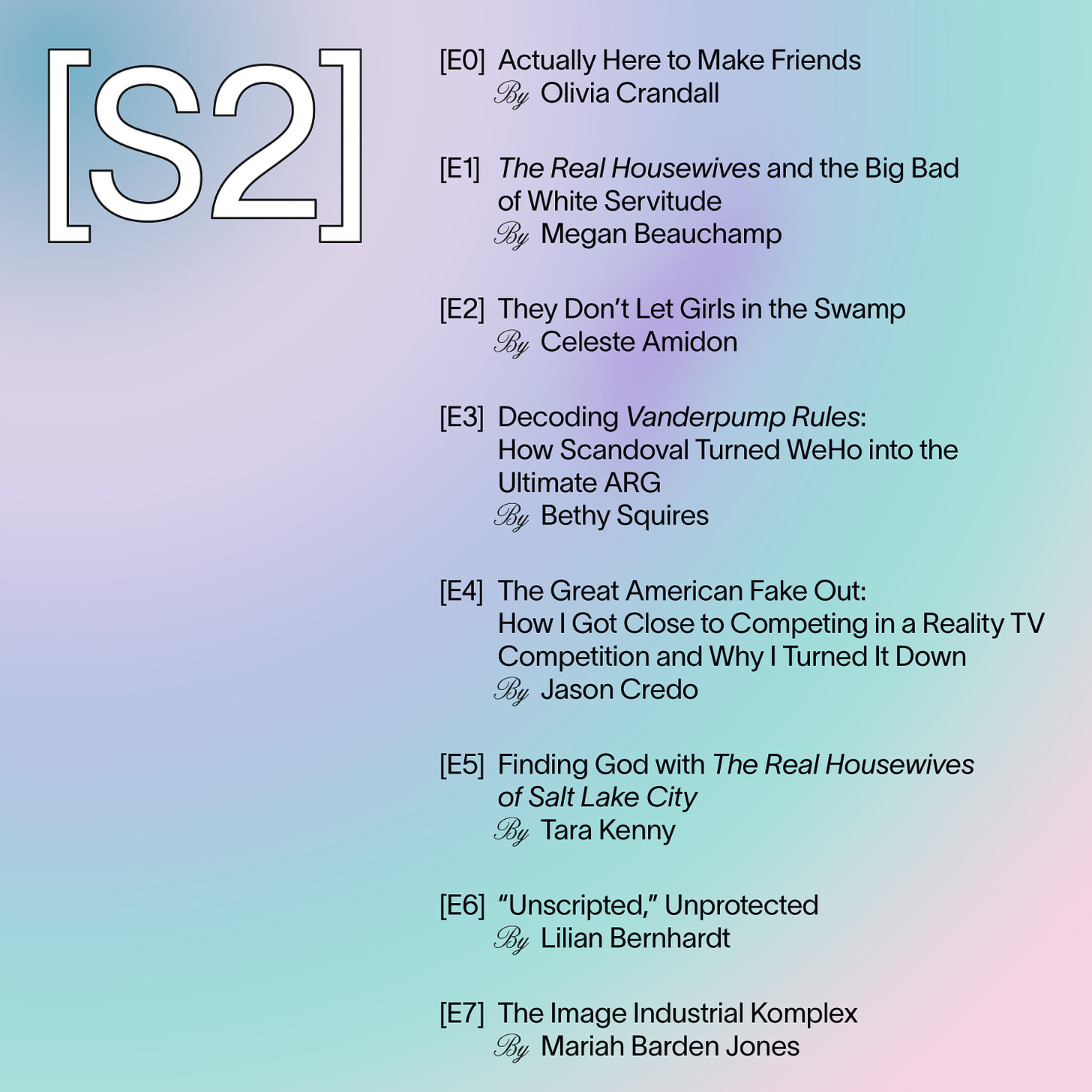What if...I'm not not here to make friends?
An excerpt from Not Here To Make Friends S2, now open for pre-orders!
Hi!
A little something different today. The issue of Not Here To Make Friends I edited is officially open for pre-orders!
If you’d like to support me, my Sexy Unique Creative Partner Elena, and all the other writers who worked on this issue:
✨ 💅 HERE is the link! 💅 ✨
If you’re a bit uncertain about indie print media or what might show up on your doorstep if you do nab a copy, below you’ll find a tiny tease in the shape of my editor’s letter.
Actually Here to Make Friends
We should probably start things off with a confession: I am actually here to make friends.
It’s how I got here in the first place. Two years ago, Elena and I were mere internet mutuals, connected only by our joint participation in a different zine. I saw she had put out Not Here to Make Friends Season 1, felt a jolt of “What do you call soulmates but platonic and for the brain?” and asked for a copy. Sharing a shipping address turned into “holy shit, we’re neighbors,” turned into “[insert absolute bricks of text messages here]” turned into “now we’re building a collective map of all the nearby stray cats.” And that was just the beginning. When Elena asked me to edit this season, I was thrilled. It was an embodiment of what reality TV has become for me and the lessons I’ve learned along the way.
I was not always a reality TV scholar, the same way I was not always a person with friends. A decade ago, I was fiercely dedicated to my identity of “not like other girls.” Sure, I grew up on The Real World and Project Runway, but I had made a firm switch to prestige TV like The Sopranos and The Wire and maybe (absolutely) Intervention if I was the right kind of intoxicated. I wasn’t some bimbo caught up in silly little girl issues! I was also miserable.
So naturally, I started watching The Bachelor. To make fun of the silly little girls, of course! Viewership as an exercise in irony. But once you start discussing reality TV with other women, you quickly realize that the ironic-earnest binary does not exist. Logically, exceptionalism is a fun game to play. It’s easy to say, “I’m not like those floozies.” But when I dug deeper (read: had gossipy chats that turned into real conversations with other women), I realized I was exactly like those floozies. And the ways they were portrayed were but a microcosm of how women are treated in the “real” world. It’s so much easier to unpack a lifetime of internalized misogyny when you’re not stubbornly looking down on everyone from the highest horse (I’m terrified of horses, anyway).
My not-so-humble opinion is that, at its best, reality TV is about friendship. Whether we’re talking about housewives or bakers, islanders or whatever you call the Selling Sunset Bratz dolls, what makes for “good TV” these days is not raw conflict. Audiences have gotten smarter, and even the best cast of actors can’t fake decades of friendship verisimilitude. Against all postmodern logic, when the friends are real, the show feels real. Maybe because it’s human nature to find connection, even in the midst of a Baudrillardian simulation. We got dozens of pitches about Scandoval not because of some man being a man but because said man was creeping all over the SUR alley, pouring his noxious white nail polish all over the female friendship rat king that could only be formed from a decade of swapping gossip and bodily fluids all over WeHo.
But this season is not a love letter. Real friends aren’t afraid to get messy, tell you when you’re fucking up. The pieces you’re about to read are far from reality TV simping. Rather, they’re a collection of the same kind of rigorous criticism, reporting, and introspection traditionally given to Succession and its ilk. Our writers explore the limits of representation, the murky role of religion, the wild casting process, the gendered assumptions of the C-Suite, the uncanny valley, the J.J. Abrams of it all, and the growing labor movement fighting against exploitation. Everything is about reality TV, but it’s also about everything. Because love it or hate it, reality TV is perhaps our most accurate cultural artifact, a funhouse mirror reflecting the way we all exist in society.
I used to say that I didn’t believe in guilty pleasures, that you should “let people like stuff.” I no longer feel this way. Or at least to that extent (I still take it personally when someone goes on a health tirade about my favorite little processed treats). But the “let people like stuff” line of thinking is not much different from choice feminism. Feeling guilty about liking something isn’t inherently a problem. Rather, it provides a space to interrogate where that guilt coming from. Is it internalized patriarchal bullshit? (In which case, carry on!) Or is it something more sinister, the body’s alarm system tripping when ideals and actions don’t meet?
Shame can be a fruitful emotion. And frankly, if I’m going to feel that way anyway, I’d much rather be basking in shame soup with my pals, analyzing and holding the paradox of our consumption collectively, each of us tasting and reporting back from our personal favorite flavors of hell.
<3
This newsletter brought to you by all the other writers who worked on the issue! Check ‘em out:





!! Very excited.
I am also a reality-tv skeptic turned reluctant enthusiast turned full fledged fan. Loved this editor’s letter, and your newsletter as a whole :)